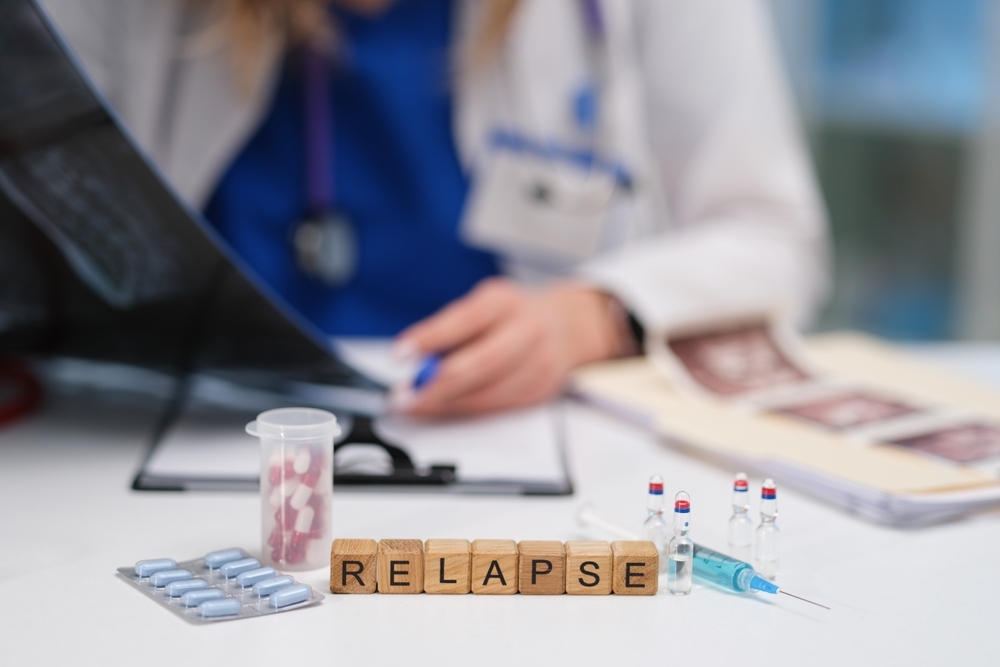Last Updated:
April 10th, 2025
Relapse is a word that victims of substance abuse disorders and their loved ones dread. A relapse can feel like all previous efforts of sobriety were fruitless and can diminish a recovering person’s self-worth.
Yet relapse is a more common part of the recovery journey than many people realise, with as many as 85% of people relapsing within the first year of recovery. We look at why relapse happens, common triggers, and prevention strategies. We hope to support you on the long road to a substance-free life.
What is a relapse?
A relapse is what happens when a person who has made efforts to quit a substance and stay sober returns to using. The goal of staying sober or reducing the amount of a drug taken is lost and previous levels of substance use resume.
Relapses can be psychologically devastating, destroying a person’s self-esteem and sense of achievement. Yet if they are truly committed to recovery, relapse does not ultimately equal failure.
Relapse is a sign that old ways of coping need to be replaced with new ones and you should know that relapse is not the end of recovery; you are capable of overcoming addiction.
What are the most common relapse triggers?
Countless factors contribute to the likelihood of relapse. They can be physical or psychological and can manifest when you least expect them. Some of the most common triggers include:
Physical withdrawal symptoms inherent to most drugs include insomnia, muscle aches, hot flushes, diarrhoea, perspiration, vomiting and nausea. These symptoms can feel overwhelming as your body starts to detoxify.
Psychological withdrawal symptoms manifest as severe cravings, depression, anxiety, lethargy, severe drowsiness (somnolence) and, in some cases, hallucinations or delusions.
Physical and psychological withdrawal symptoms, in combination, can make you feel like using the drug again is the only relief, tragically increasing the likelihood of relapse for many.
As substances leave the body, pre-existing conditions like PTSD and anxiety may become more pronounced. Many people use drugs or alcohol to numb emotional pain, so in their absence, emotions can intensify and become harder to manage.
This emotional strain often leads to self-isolation, which compounds mental health struggles. A recent study shows that people who are socially isolated are at a higher risk of substance use disorders and relapsing. For many, maintaining genuine human connection is just as vital as avoiding triggers, reinforcing the importance of seeking support rather than facing challenges alone.
One piece of research suggests that relapse rates for people in recovery spike to 150% during holiday seasons. When everyone around is rejoicing and making the most of time off work, sobriety can make you feel lonely.
Contributing stressors during the holidays can be increasing interpersonal conflicts, with family get-togethers bringing family conflicts to the surface. Recovering people can feel gift stress and financial strain that intensify worries or drive them to isolate, further increasing the risk of relapse.
How can I help my chances of avoiding relapse?
When urges to return to substance use become overwhelming, and thoughts of relapse start to take hold, it’s crucial to have strategies in place. Use some of these steps as a source of support in difficult times:
Changing the people, places and things around you helps to reduce the way your brain associates objects and settings with substance use. Triggers can be overt, like being near drug paraphernalia, or subtle, such as the sound of tinkling glasses. Both can reignite deep cravings for a substance.
Set boundaries with people who encourage or downplay substance use, avoid locations tied to past addictive behaviours and spend time identifying and reducing stimuli that create urges. You might have spent years with an addiction, saying yes to harmful situations. Learning to say “no” takes practise but can provide liberation in recovery.
As best you can, make efforts to prioritise your diet, sleep and exercise. Health experts sometimes call these three the “wellness triad.” Improving one gives you the sustenance to, in turn, improve another, triggering a cycle of positive influence. Track and journal the progress you make in each and see them as achievements.
Romanticising the past can make you forget why you’re pursuing long-term recovery plans in the first place, and recurring urges start to feel like tidal waves coursing through your body. Recognise how your mind may be falsely reflecting on the past to get you to satisfy your cravings and relapse. Talk with family and loved ones about how tumultuous those times really were, and stay resolute in your sobriety. You can get through this.
Strive to fill this time with activities that are meaningful to you. Many treatment programmes encourage activities like painting, music and writing as creative outlets. Joining a sports team or martial arts class can be an especially cathartic outlet for new emotions.
- Support groups like AA and SMART Recovery can connect you with people who are going through the same tribulations and become a deep source of addiction help.
- Therapists, sponsors and mentors can help establish accountability and help you recognise sobriety achievements, whether big or small.
- A network of sober friends and family members can be the supporting pillar you need to stay sober and avoid relapse. Lean into the support of loved ones.
I need support with addiction and relapse prevention
Stopping yourself from relapsing can, at times, feel impossible. Whether you’re in the early stages or years into the recovery journey, having the right tools and guidance can keep you on track.
At Linwood House, we specialise in treatment programmes that help you build a substance-free life. Our approach includes personalised relapse prevention plans, one-on-one therapy and holistic support tailored to your needs.
You don’t have to do this alone. If you or a loved one are struggling with addiction and relapse prevention, contact us today. Your path to lasting recovery starts here.
(Click here to see works cited)
- Sinha R. New findings on biological factors predicting addiction relapse vulnerability. Curr Psychiatry Rep. 2011 Oct;13(5):398-405. doi: 10.1007/s11920-011-0224-0. PMID: 21792580; PMCID: PMC3674771
- Desai R, Karim S, Freeborn J, et al. Contextualizing the relationship between social isolation and substance abuse. Prim Care Companion CNS Disord . 2024;26(5):23m03679
- Therapy, Center for Network. “Drug and Alcohol Relapse Rates Spike 150% during the Holidays.” PR Newswire: Press Release Distribution, Targeting, Monitoring and Marketing, Cision PR Newswire, 13 Dec. 2018, www.prnewswire.com/news-releases/drug-and-alcohol-relapse-rates-spike-150-during-the-holidays-300764679.html.
- “Why Change People, Places, and Things in Early Recovery?” Psychology Today, Sussex Publishers, www.psychologytoday.com/intl/blog/understanding-addiction/202106/why-change-people-places-and-things-in-early-recovery
- Gupta M, Gokarakonda SB, Regina AC, et al. Withdrawal Syndromes. [Updated 2024 Sep 2]. In: StatPearls [Internet]. Treasure Island (FL): StatPearls Publishing; 2025 Jan-. Available from: https://www.ncbi.nlm.nih.gov/books/NBK459239/
- IBPCEU, www.ibpceu.com/content/pdf/PBDDL1S22.pdf


